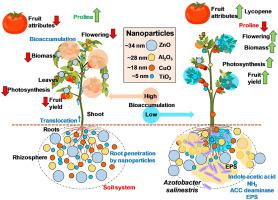Environmental Pollution ( IF 8.9 ) Pub Date : 2020-12-02 , DOI: 10.1016/j.envpol.2020.116218 Bilal Ahmed , Asad Syed , Asfa Rizvi , Mohammad Shahid , Ali H. Bahkali , Mohammad Saghir Khan , Javed Musarrat

|
The current study for the first time demonstrates the interference of a free-living, N2-fixing, and nanoparticle (NP) tolerant Azotobacter salinestris strain ASM recovered from metal-polluted soil with tomato plant-metal oxide NPs (ZnO, CuO, Al2O3, and TiO2) interactions in a sandy clay loam soil system with bulk materials as control. Tomato plants were grown till full maturity in soils amended with 20–2000 mg kg−1 of each metal-oxide NP with and without seed biopriming and root-inoculation of A. salinestris. A. salinestris was found metabolically active, producing considerably high amounts of bioactive indole-3-acetic-acid, morphologically unaffected, and with low alteration of cell membrane permeability under 125–1500 μgml−1 of NPs. However, ZnO-NPs slightly alter bacterial membrane permeability. Besides, A. salinestris secreted significantly higher amounts of extracellular polymeric substance (EPS) even under NP exposure, which could entrap the NPs and form metal-EPS complex as revealed and quantified by SEM-EDX. NPs were also found adsorbed on bacterial biomass. EPS stabilized the NPs and provided negative zeta potential to NPs. Following soil application, A. salinestris improved the plant performance and augmented the yield of tomato fruits and lycopene content even in NPs stressed soils. Interestingly, A. salinestris inoculation enhanced photosynthetic pigment formation, flower attributes, plant and fruit biomass, and reduced proline level. Bacterial inoculation also reduced the NP’s uptake and accumulation significantly in vegetative organs and fruits. The organ wise order of NP’s internalization was roots > shoots > fruits. Conclusively, A. salinestris inoculation could be an alternative to increase the production of tomato in metal-oxide NPs contaminated soils.
中文翻译:

金属氧化物纳米颗粒对盐渍固氮菌ASM调节番茄(Solanum lycopersicum L.)生长,生理和产量的影响
当前的首次研究表明,从金属污染的土壤中回收的自由活动,N 2固定和纳米颗粒(NP)耐盐固氮盐杆菌菌株ASM对番茄植物金属氧化物NPs(ZnO,CuO,Al 2 O 3和TiO 2)在砂质壤土土壤系统中的相互作用,散装物料为对照。番茄植物在与20-2000毫克千克修正土壤上种植直到完全成熟-1各金属氧化物NP具有和不具有种子biopriming和的根接种A. salinestris。咸水曲霉被发现具有代谢活性,在125-1500μgml- 1的NPs下可产生大量的生物活性吲哚-3-乙酸,形态上不受影响,并且细胞膜通透性的变化小。但是,ZnO-NPs会稍微改变细菌膜的通透性。此外,盐毒曲霉即使在NP暴露下也分泌大量的细胞外聚合物(EPS),这可能捕获NP并形成金属-EPS复合物,如通过SEM-EDX揭示和定量的。还发现NP吸附在细菌生物质上。EPS稳定了NP,并为NP提供了负的Zeta电位。施用土壤后,A。saltstris即使在NPs胁迫的土壤中,也改善了植物的性能并增加了番茄果实的产量和番茄红素含量。有趣的是,A。saltstris接种增强了光合色素的形成,花朵属性,植物和水果的生物量,并降低了脯氨酸的含量。细菌接种还显着降低了NP在营养器官和水果中的吸收和积累。NP内部化的器官顺序是根>芽>果实。结论是,接种A. saltstris可以增加在金属氧化物NPs污染的土壤中增加番茄的产量。



























 京公网安备 11010802027423号
京公网安备 11010802027423号